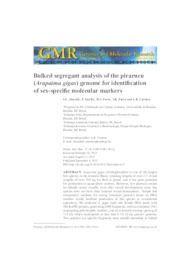Bulked segregant analysis of the pirarucu (Arapaima gigas) genome for identification of sex-specific molecular markers.
Bulked segregant analysis of the pirarucu (Arapaima gigas) genome for identification of sex-specific molecular markers.
Author(s): ALMEIDA, I. G.; IANELLA, P.; FARIA, M. T.; PAIVA, S. R.; CAETANO, A. R.
Summary: Arapaima gigas (Osteoglossidae) is one of the largest fish species in the Amazon Basin, attaining lengths of over 2.5 m and weights of over 100 kg. Its flesh is prized, and it has great potential for production in aquaculture systems. However, live pirarucu cannot be reliably sexed visually, even after sexual development, since this species does not have clear external sexual dimorphism. Simple and inexpensive methods for sexing immature pirarucu based on DNA markers would facilitate production of this species in commercial operations. We analyzed A. gigas male and female DNA pools with 566 RAPD primers, generating 2609 fragments, with an estimated 1341 segregating polymorphic markers, and an estimated average spacing of 714 kb, which corresponds to less than 0.1% of the species' genome. Two putative sex-specific fragments were initially identified in bulked samples; but they were not confirmed in a study of individual male and female samples. We suggest that A. gigas has developed a non-chromosomal system of sex determination or, alternatively, that the species has undergone a recent loss of the chromosome carrying the sex-determining locus.
Publication year: 2013
Types of publication: Journal article
Observation
Some of Embrapa's publications are published as ePub files. To read them, use or download one of the following free software options to your computer or mobile device. Android: Google Play Books; IOS: iBooks; Windows and Linux: Calibre.
Access other publications
Access the Agricultural Research Database (BDPA) to consult Embrapa's full library collection and records.
Visit Embrapa Bookstore to purchase books and other publications sold by Embrapa.

